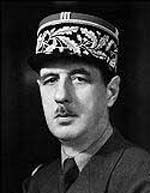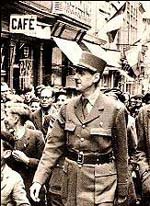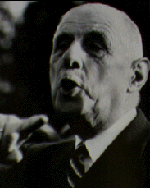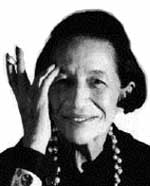Personnes
Charles de Gaulle
2 Nov 1890 (Lille) - 9 Nov 1970 (Paris)De Gaulle is an exasperating figure, but also a towering one, physically (he was 6 feet 5 inches tall) and nationally; he has been called the Last Great Frenchman. His intransigence infuriated his colleagues and his allies, and eventually alienated his public, but he saw clearly how the new kind of war would have to be fought, and what France would have to do politically in order to survive not fighting it that way.
He was born at Lille, graduated from the military academy St Cyr in 1912, and with the rank of second lieutenant joined an infantry regiment under Pétain in 1913. He was wounded in the early fighting of WW1 (1915) and promoted to captain. In the fighting at Verdun in 1916 was captured by the Germans. Five attempts to escape were unsuccessful. After the Armistice, he joined a Polish regiment then training in France, under Weygand; he was decorated by Poland for his services in the Russian Civil War. He then lectured at the French War College, where with Pétain he advocated a small, professional, and highly maneuverable army. His published views of war went against the prevailing Maginot Line static and defensive thinking then dominant in France. In 1936 his name was removed from the promotion list. At the outbreak of WW2, he was given command of a tank unit in Alsace, where his views of how to use tanks again conflicted with those of the higher command. His counterattack (with the new 4th Armored Division) on the Germans after the breakthrough at Sedan was unsuccessful due to lack of air support, but later at Caumont (28 May 1940) he became the only French general to cause a German retreat in the otherwise disastrous series of French defeats.
On 5 June 1940, Prime Minister Reynaud appointed de Gaulle Minister of War. He returned from a visit to England on 16 June to find that Pétain was forming a government to seek an armistice with Germany. Negotiations with the British followed, seeking to release France from its treaty obligations. De Gaulle, who favored fighting on, was in an impossible position, and with British help he escaped to England, and immediately broadcast an appeal to Frenchmen everywhere to resist the German presence
Here is one of the dramatic moments in the history of nations. We will let Churchill tell it:
On the afternoon of June 16 [1940], M Monnet and General de Gaulle visited me in the Cabinet Room [in London]. The General in his capacity of Under-Secretary of State for National Defense had just ordered the French ship Pasteur, which was carrying weapons to Bordeaux from America, to proceed instead to a British port. Monnet was very active upon a plan to transfer all French contracts for munitions in America to Britain if France made a separate peace. He evidently expected this, and wished to save as much as possible from what seemed to him to be the wreck of the world. His whole attitude in this respect was most helpful . . . My two French visitors then got up and moved towards the door, Monnet leading. As they reached it, de Gaulle, who had hitherto scarcely uttered a word, turned back, and, taking two or three paces towards me, said in English: "I think you are quite right." Under an impassive, imperturbable demeanour he seemed to me to have a remarkable capacity for feeling pain. I preserved the impression, in contact with this very tall, phlegmatic man, "Here is the Constable of France." He returned that afternoon in a British aeroplane, which I had placed at his disposal, to Bordeaux. But not for long.
On the morning of the 17th, I mentioned to my colleagues in the Cabinet a telephone conversation which I had had during the night with General Spears, who said he did not think he could perform any useful service in the new structure at Bordeaux. He spoke with some anxiety about the safety of General de Gaulle. Spears had apparently been warned that as things were shaping it might be well for de Gaulle to leave France. I readily assented to a good plan being made for this. So that very morning - the 17th - de Gaulle went to his office in Bordeaux, made a number of engagements for the afternoon as a blind, and then drove off to the airfield with his friend Spears to see him off. They shook hands and said good-bye, and as the plane began to move, de Gaulle stepped in and slammed the door. The machine soared off into the air, while the French police and officials gaped. De Gaulle carried with him, in this small aeroplane, the honour of France.
That same evening, Churchill made his memorable broadcast to the French people. One passage should be quoted here:
France is not alone. She has a vast Empire behind her. She can unite with the British Empire, which holds the seas, and is continuing the struggle. She can utilise to the full, as England is doing, the vast industrial resources of the United States.
The official French reaction to all this was predictable. Pétain denounced de Gaulle, who was court-martialed on 4 July and sentenced to four years' imprisonment; on 2 August, this was changed to a sentence of death. De Gaulle succeeded in unifying several Resistance groups in March 1943, but within two months the network was discovered and disabled by the occupying Germans. De Gaulle had meanwhile moved to French territory in Algeria in May, and with Henri Giraud established the French Committee for National Liberation. By July, Giraud's role was limited to command of the available armed forces, leaving De Gaulle in charge politically. In May 1944, with the Allied invasion of Europe imminent, De Gaulle directed that his movement be recognized as the Provisional Government of France. This infuriated the British and Americans, who excluded him from the invasion planning, but gained recognition in some quarters (Norway, Belgium, Luxembourg, Czechoslovakia, Yugoslavia), and on 13 July Britain and America agreed that de Gaulle could have a role in administering liberated French territory.
He entered France on 20 August, and his 2nd Armored Division joined the Americans in entering Paris on 25 August. Later that day he announced the integration of the Resistance forces into the regular French army, and gave positions to several Resistance leaders (Bidault, Frenay, Tillon). De Gaulle was excluded from the Yalta Conference, where plans for postwar Europe were made by Britain, America, and Russia, but took part in the surrender ceremonies. On 13 November 1945, De Gaulle was unanimously elected head of the French government, a position he held only until resigning it on 20 January 1946. He subsequently formed his own right-wing party, which was initially successful but later declined in popularity. de Gaulle left it in 1953 and it vanished two years later. During this time de Gaulle wrote the first three volumes of his memoirs.
He was again elected President in 1953, at the time of the Algerian crisis. He negotiated independence for all thirteen of France's colonies, though the Algerian war continued until 1962. Despite these territorial losses, de Gaulle pursued an assertive policy of French independence, developing a separate French nuclear capability, blocking Britain's entry into the European Economic Community, and in 1966 withdrawing France from the NATO organization. The student riots of 1968 (for a vignette, see in the main Mots section), followed by a negative public referendum, led to his resignation in April 1969. He had just enough time to finish his memoirs before his death a year and a half later.
Here is Diana Vreeland's impression of de Gaulle toward the end of his career:
There's no such thing as a slack French face. Haven't you ever noticed that? I've given this a lot of thought, and I think it's because the French have to exercise their jaws and the inside of their mouths so much just to get the words out. The vowels demand so much. In fact, the French language has a lot to do with handsomeness and the beauty of the French face. Talk one line in French and the whole inside of your face moves, whereas the English language leaves you a bit slack. I'll give you an example: Look in the mirror. Now say "Ché-rie!" Did you see what your face just did? Did you see all the exercise you got? Now try "Dear." No exercise there.
But to get on with it, there never was a more French face than de Gaulle's. France was . . . de Gaulle. And, as you know, the French like the French very much. De Gaulle was full of the old amour propre all right, he loved himself. And he was my hero, as he was for much of France and much of the world for many, many years.
In the middle sixties he'd fallen out of favor. I'd just arrived in Paris to cover the collections, and I was dining with the young married set - all very charming, but rather comme il faut, shall we say. I was full of my own worth. So I said, "You know, when anything extraordinary happens here, you can't take it. Now take de Gaulle -"
"Oh!" They went to pieces. "You're not going to try and sell us de Gaulle?"
"I'm not selling," I said, "I'm only telling you."
"But we're thinking of our country!"
"I am too. I don't live here, but I know heroes. You've got to have a hero. You've got to have a face. You've got to have a leading man. I'll give you an example: If everyone at this table was responsible for ordering the dinner, would we ever get a bite to eat?"
Then I went on. "How many people will come through the corridors - through the bloodstream - of history in the last fifty years the way de Gaulle will? Who fought so that France would continue to exist? When there was no place for him to fight here, who went to London and waited like an errand boy for Churchill to listen to him? Why, I don't understand why you're treating him the way you are. Do you think that whatever is bourgeois and ordinary and 'so what' is great" Anything extraordinary . . . that's what France really stands for - the supreme logic of the extraordinary!"
I really gave them a bit of what for!
The next day I got a call from one of the chaps at the table.
"Diana, we believe in desire and passion. When anyone loves with your passion, they should be closer to the person they love. So I've arranged for you to go to his press conference. I will hold your ticket for you. Come as soon as you can."
As soon as I'd hung up the phone, I turned to Reed and told him what had happened. I said to Reed, "Chanel is opening this afternoon at three-thirty - I can't possibly do it!"
"Why?" he said.
"Well," I said, "because Chanel is . . . I mean, after all, I'm paid to cover these collections."
I had the most marvelous husband. He was always on the right side. He always knew what to do, and what to say to me.
"You are? What's the matter with you? You're so cracked about this fellow de Gaulle, and you get this unique opportunity, everything arranged for you, and you bring up Chanel, whose clothes you've only been looking at since 1925!"
So I sent a message to Mademoiselle Chanel saying that, unfortunately, I'd broken a tooth on a piece of bread (which was a very good excuse - all Americans do, on French crusts) and that I couldn't attend.
Well, I went to the press conference. I arrived at the Elysée Palace, but I didn't have my passport. "Passeport, Madame, passeport!" the gendarmes said. It was rather windy, so their capes sort of blew this way and I sort of went that way and went right on in. How could they keep me out?
I took my seat in the second row. And then, in the most beautiful voice - trained, I have no doubt, by the Comédie Française - my hero said, "Mesdames, messieurs . . ."
I mean, the beauty of the language. The pleading for the morals! He had the most beautiful diction. And he had the hands of the Comédie Française too - the hands of a leader, the hands, almost, of a Messiah. It was the most thrilling experience.
I also made a great discovery. In the usual photograph you see of de Gaulle from the sixties he's almost totally bald. When I saw him, I realized that his hairline was much closer to his face - a very distinguished hairline framing a small, completely refined, totally French face. Now, obviously, he wasn't done up for the photographs - this is the general of an army and the President of France! There was no monkey business there.
When I got back to the Crillon, where we were staying, after these splendid hours of being a part of this glorious man, my hero, there were red roses waiting for me - red red roses. They were from Coco Chanel - the kind Chanel always sent, the kind that open, not the kind that shrivel up into a little walnut and die . . .
Thus did Vreeland's memory, like that of France itself, wander to other things. All this is now a long time ago. On balance, and despite all, de Gaulle did preserve something of national pride, for a country that had suffered, not only the agony of conquest, but the ignominy of being liberated from that conquest by others.
13 Dec 2005 / Contact The Project / Exit to Reference Page




